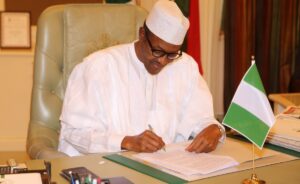 Nigerian President Muhammadu Buhari is scheduled to meet US President Donald Trump on Monday, April 30th . His visit comes less than four months since Trump made the comment about “shithole” countries in Africa. Trump’s comments were followed by a swift denial and a lukewarm attempt to mend fences.
Nigerian President Muhammadu Buhari is scheduled to meet US President Donald Trump on Monday, April 30th . His visit comes less than four months since Trump made the comment about “shithole” countries in Africa. Trump’s comments were followed by a swift denial and a lukewarm attempt to mend fences.
But his lethargic attitude to the continent is undeniable. This was underscored by the fact that the president sacked former Secretary of State Rex Tillerson when he was on an African tour, forcing him to cut his trip short. Further evidence of his perceived indifference is the fact that he has not appointed substantive senior leadership within the state department to handle African affairs. As a result, his African policy is driven by a makeshift team that has shown no real desire to mediate Africa’s strategic interests and aspirations.
So how does Nigeria, one of Africa’s largest economies, fit into America’s unclear vision for the continent? With a population of more than 180 million people, Nigeria is an African power house. And because of its complex religious, ethnic and regional dynamics, it presents both a challenge and an opportunity for the US.
The agenda
Perhaps Buhari’s trip to Washington will be used to reset Nigeria-US relations, particularly after the fallout from Trump’s shithole comment. The comment was particularly disturbing in Nigeria because over 700,000 Nigerians were found to be following Trump’s tweets – that’s more than 2% of his 32 million followers. This shows just how interested Nigerians are in the American  president and his policies.
president and his policies.
But it’s also worth remembering that Nigeria remains one of the most corrupt countries in the world. Levels of corruption have even diluted the country’s efforts in the war on terror.
Nigeria has been unable to deal decisively with the Boko Haram menace despite buying military equipment worth millions of dollars from the US. Its inability to wipe out Boko Haram has destabilised the West African region and caused a widespread refugee crisis.


